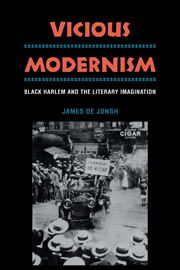Book contents
- Frontmatter
- Contents
- Acknowledgments
- Introduction: Vicious Modernism
- I The Legendary Capital: The 1920s and 1930s
- II The Emerging Ghetto: The 1940s and 1950s
- III The Inner City: The 1960s and 1970s
- 9 The Inner City
- 10 Jitterbugging in the Streets
- 11 Echoes in a Burnt Building
- 12 Mumbo Jumbo
- Epilogue: Black Harlem and the Literary Imagination
- Appendix 1 A Checklist of Black Harlem in Poetry
- Appendix 2 A Checklist of Black Harlem in Novels
- Notes
- Index
- Frontmatter
- Contents
- Acknowledgments
- Introduction: Vicious Modernism
- I The Legendary Capital: The 1920s and 1930s
- II The Emerging Ghetto: The 1940s and 1950s
- III The Inner City: The 1960s and 1970s
- 9 The Inner City
- 10 Jitterbugging in the Streets
- 11 Echoes in a Burnt Building
- 12 Mumbo Jumbo
- Epilogue: Black Harlem and the Literary Imagination
- Appendix 1 A Checklist of Black Harlem in Poetry
- Appendix 2 A Checklist of Black Harlem in Novels
- Notes
- Index
Summary
After the riot of 1964, writers of fiction continued to employ black Harlem as a psychologically and socially realistic setting for narratives, as had authors in the 1940s and 1950s, for like earlier realists, most novelists – particularly black novelists – continued to assume “that man is a social being who ought not to be separated from the social and historical context, no matter how alienating and discontinuous, in which he finds his significance and develops his potential as an individual.” Achieving the illusion of fully developed human experience remained the overriding aesthetic impulse in the majority of Harlem narratives in the 1960s and 1970s. In such novels, Harlem was depicted as a landscape of discrimination, exploitation, and despair, reflecting the nadir to which Harlem's deterioration had plummeted during the decade, and figuration was limited by verisimilitude. In a range of works, narfativity corresponded to the recognizable and credible actuality of the Harlem setting.
Double Dunk, Barry Beckham's fictionalized retelling of the life of Harlem basketball star Earl (“the Goat”) Manigault, is “a cautionary tale about the deleterious effects of ghetto existence.” The protagonist of George Cain's Blueschild Baby, also named George Cain, returns from prison to wander “the corridors of bedlam” of hard-core drug use in Harlem and finally to harrow hell, in three days of drug withdrawal. Louise Meriwether's Daddy Was a Number Runner is a funky, textured memoir about growing up black in Harlem, which proceeds to a single conclusive epithet: “‘Shit.’
- Type
- Chapter
- Information
- Vicious ModernismBlack Harlem and the Literary Imagination, pp. 197 - 208Publisher: Cambridge University PressPrint publication year: 1990



